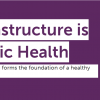0
Research
Community:
May 25, 2023
We all want to live in a community where everyone has access to safe drinking water, green parks, and a reliable transit system. Strong infrastructure is key to ensuring communities have access to these necessities.
But this is not everyone’s reality today. For decades, barriers like residential segregation have fueled a lack of investment and inadequate and failing infrastructure in places where Black, Latino, and Indigenous people live today. These inequities create barriers to good health.
Investing in infrastructure—the building blocks of our communities—can transform communities so they are healthier and more equitable places to live.
Authored by: Robert Wood Johnson Foundation
Topics: Environmental Resiliency/Climate Change, Green, Health, Racial inequalities, Research, Transportation
 Shared by Sandra Ware
Shared by Sandra Ware
Sandra Ware posted a
on May 25, 2023
Robert Wood Johnson Foundation
We all want to live in a community where everyone has access to safe drinking water, green parks, and a reliable transit system. Strong infrastructure is key to ensuring communities have access to these necessities.
But this is not everyone’s reality today.
0
Research
Community:
Jul 19, 2022
This ebook, authored by Next City, explores ways that creative placemaking can expand opportunities for low-income people living in disinvested communities.
The journalism Next City has produced for the series “For Whom, By Whom” chronicles how creative placemaking can expand opportunities for low-income people living in disinvested communities. These stories give lie to the false narrative that such neighborhoods are home to violence and deprivation instead of talent, imagination, and solutions. Here are communities that produce incredible feats despite being terminally under-resourced, and despite systemic neglect that has persisted for generations.
Authored by:
Topics: Community development, Mobility, Place-based, Racial inequalities, Research
 Shared by Malcolm Guy
Shared by Malcolm Guy
Malcolm Guy posted a
on Jul 19, 2022
This ebook, authored by Next City, explores ways that creative placemaking can expand opportunities for low-income people living in disinvested communities.
The journalism Next City has produced for the series “For Whom, By Whom” chronicles how creative placemaking can expand opportunities for lo
0
Research
Community:
Aug 5, 2019
CLPHA developed a general data sharing template that public housing authorities (PHAs) and their health partners can customize to suit their data sharing and collaboration needs. Please feel free to comment to share any uses/modifications your organization made to implement into a partnership.
Authored by:
Topics: Affordable Care Act, CLPHA, Community development, Cost effectiveness, Data sharing, Dental, Depression, Dual-eligibles, Funding, Health, Healthy homes, Legislation & Policy, Low-income, Medicaid / Medicare, Mental health, Metrics, MTW, Nutrition, Obesity, Partnerships, Place-based, Preventative care, Racial inequalities, Research, SAMHSA, Smoke-free, Stability, Substance abuse, Supportive housing, Sustainability, TA
 Shared by Steve Lucas
Shared by Steve Lucas
Steve Lucas posted a
on Aug 5, 2019
Disclaimer: This template is provided for informational purposes only and not for the purpose of providing legal advice. You should contact your attorney to obtain advice with respect to any particular issue or question. Use of this template, including its exhibits and attachments, does not create a relationship or any responsibilities between CLPHA and the user.
CLPHA developed a general data sharing template that public housing authorities (PHAs) and their health partners can customize to suit their data sharing and collaboration needs. Please feel free to comment to share any uses/modifications your organization made to implement into a partnership.
0
News Article
Community:
Jun 4, 2019
A new study finds that higher percentages of wealthy, Asian, and white residents live in HOAs; and people pay a premium of about 4 percent for homes in HOAs.
Authored by: David Montgomery for CityLab
Topics: Community development, Housing, Legislation & Policy, Racial inequalities, Research
 Shared by Housing Is
Shared by Housing Is
Housing Is posted a
on Jun 6, 2019
David Montgomery for CityLab
A new study finds that higher percentages of wealthy, Asian, and white residents live in HOAs; and people pay a premium of about 4 percent for homes in HOAs.
0
News Article
Community:
May 16, 2019
In African American neighborhoods like Williams’ South Chicago, landlords file for evictions at a substantially higher rate than in other parts of the city, according to a new report from the Lawyers’ Committee for Better Housing, a local housing advocacy organization that reviewed nearly 300,000 Cook County eviction court records for 2010 through 2017. In 2017, landlords in majority-African American neighborhoods filed for evictions four times more often than in white neighborhoods, the report found.
Authored by: Javonte Anderson for The Chicago Tribune
Topics: Homelessness, Housing, Midwest, Racial inequalities
 Shared by Housing Is
Shared by Housing Is
Housing Is posted a
on May 30, 2019
Javonte Anderson for The Chicago Tribune
In African American neighborhoods like Williams’ South Chicago, landlords file for evictions at a substantially higher rate than in other parts of the city, according to a new report from the Lawyers’ Committee for Better Housing, a local housing advocacy organization that reviewed nearly 300,000 Co
0
News Article
Community:
May 13, 2019
How do you fix health inequity in the United States? The education and health-care communities as well as policymakers must consider what are known as the social determinants of health as an integral part of solving this dilemma. Additionally, communities need to stop thinking of health care as care only received in a medical environment such as a hospital or clinic. Instead we must consider health-care holistically as a service given in our homes, our schools, our workplaces, our parks and our communities. These services are provided by an array of health-care providers, including nurses, physicians, psychologists, dentists, social workers and many more — over 13 million strong.
Authored by: Beverly Malone for The Hill
Topics: Food insecurity, Health, Lead, Legislation & Policy, Nutrition, Racial inequalities, Transportation
 Shared by Housing Is
Shared by Housing Is
Housing Is posted a
on May 20, 2019
Beverly Malone for The Hill
How do you fix health inequity in the United States? The education and health-care communities as well as policymakers must consider what are known as the social determinants of health as an integral part of solving this dilemma.
0
News Article
Community:
May 12, 2019
Charlotte city planners working to rewrite outdated zoning codes are exploring a controversial and bold idea of eliminating single-family zoning. Leaders are following cues from other cities like Minneapolis, Minnesota, and Grand Rapids, Michigan, which have taken the step in an effort to undo decades of racial segregation and income inequality in housing.
Authored by: Jessa O'Connor for WFAE 90.7
Topics: Housing, Legislation & Policy, Low-income, Racial inequalities, South
 Shared by Housing Is
Shared by Housing Is
Housing Is posted a
on May 20, 2019
Jessa O'Connor for WFAE 90.7
Charlotte city planners working to rewrite outdated zoning codes are exploring a controversial and bold idea of eliminating single-family zoning.
0
Research
Community:
Mar 14, 2019
Despite abundant evidence about the effect of children’s socioeconomic circumstances on their transition to adulthood, we know much less about the effect of social policy programs aimed at poor families with children in facilitating how and when children become adults. This issue is particularly important for the U.S. federal subsidized housing program given its long history of placing subsidized units in some of the poorest and most racially segregated neighborhoods. Using counterfactual causal methods that adjust for the length of receipt of subsidized housing, I estimate the effect of subsidized housing on teenage parenthood, household formation, and educational attainment. I find that the subsidized housing program has either null or positive effects on the transition to adulthood and that these effects vary by both race and gender. These results underscore the importance of considering whether social programs have differential effects on the life chances of individuals based on both race and gender.
Authored by: Yana Kucheva for Demography
Topics: Homelessness, Housing, Racial inequalities, Research, Youth
 Shared by Housing Is
Shared by Housing Is
Housing Is posted a
on May 20, 2019
Yana Kucheva for Demography
Despite abundant evidence about the effect of children’s socioeconomic circumstances on their transition to adulthood, we know much less about the effect of social policy programs aimed at poor families with children in facilitating how and when children become adults.
0
News Article
Community:
Apr 27, 2019
Nationwide, the arrival of white homeowners in places they’ve long avoided is jolting the economics of the land beneath everyone.
Authored by: Emily Badger, Quoctrung Bui, and Robert Gebeloff for The New York Times
Topics: Housing, Racial inequalities
 Shared by Housing Is
Shared by Housing Is
Housing Is posted a
on May 2, 2019
Emily Badger, Quoctrung Bui, and Robert Gebeloff for The New York Times
Nationwide, the arrival of white homeowners in places they’ve long avoided is jolting the economics of the land beneath everyone.
0
News Article
Community:
Apr 25, 2019
The Cook County Board on Thursday passed limits on the practice of asking potential tenants about their criminal histories, despite pleas to hold off until landlords and property owners had a chance to air their concerns.
Authored by: Rachel Hinton for Chicago Sun Times
Topics: Criminal justice, Housing, Legislation & Policy, Racial inequalities
 Shared by Housing Is
Shared by Housing Is
Housing Is posted a
on May 2, 2019
Rachel Hinton for Chicago Sun Times
The Cook County Board on Thursday passed limits on the practice of asking potential tenants about their criminal histories, despite pleas to hold off until landlords and property owners had a chance to air their concerns.
0
News Article
Community:
Apr 26, 2019
In the District of Columbia, low-income residents are being pushed out of neighborhoods at some of the highest rates in the country, according to the Institute on Metropolitan Opportunity, which sought to track demographic and economic changes in neighborhoods in the 50 largest U.S. cities from 2000 to 2016.
Authored by: Marissa J. Lang for The Washington Post
Topics: Community development, Housing, Low-income, Racial inequalities
 Shared by Housing Is
Shared by Housing Is
Housing Is posted a
on Apr 26, 2019
Marissa J. Lang for The Washington Post
In the District of Columbia, low-income residents are being pushed out of neighborhoods at some of the highest rates in the country, according to the Institute on Metropolitan Opportunity, which sought to track demographic and economic changes in neighborhoods in the 50 largest U.S.
0
Research
Community:
May 18, 2018
Parent involvement is associated with child academic outcomes, positive behaviors, and social skills. This qualitative study explored school-based parent involvement barriers experienced by nine low-income mothers. In-depth interviews were used to collect data from mothers participating in a community-based program offered in a large public housing neighborhood. Findings included three main barriers: (a) cultural and language differences in their children’s school, (b) undertones of racism from teachers and parents, and (c) being the primary caregiver or sole provider for their children. Although all parents experience challenges to school involvement, low-income mothers face additional obstacles preventing them from engaging in their children’s schools. This perceived lack of school involvement can lead to feelings of helplessness, shame, and stigma.
Authored by: Stephanie Lechuga-Pena and Daniel Brisson for TQR
Topics: Education, Family engagement, Housing, Low-income, Racial inequalities, Research
 Shared by Housing Is
Shared by Housing Is
Housing Is posted a
on Apr 25, 2019
Stephanie Lechuga-Pena and Daniel Brisson for TQR
Parent involvement is associated with child academic outcomes, positive behaviors, and social skills. This qualitative study explored school-based parent involvement barriers experienced by nine low-income mothers.
0
Research
Community:
Nov 27, 2018
A growing body of research suggests that housing eviction is more common than previously recognized and may play an important role in the reproduction of poverty. The proportion of children affected by housing eviction, however, remains largely unknown. We estimate that one in seven children born in large U.S. cities in 1998–2000 experienced at least one eviction for nonpayment of rent or mortgage between birth and age 15. Rates of eviction were substantial across all cities and demographic groups studied, but children from disadvantaged backgrounds were most likely to experience eviction. Among those born into deep poverty, we estimate that approximately one in four were evicted by age 15. Given prior evidence that forced moves have negative consequences for children, we conclude that the high prevalence and social stratification of housing eviction are sufficient to play an important role in the reproduction of poverty and warrant greater policy attention.
Authored by: Ian Lundberg and Louis Donnelly
Topics: Early childhood, Homelessness, Housing, Low-income, Racial inequalities, Research
 Shared by Mica O'Brien
Shared by Mica O'Brien
Mica O'Brien posted a
on Apr 18, 2019
Ian Lundberg and Louis Donnelly
A growing body of research suggests that housing eviction is more common than previously recognized and may play an important role in the reproduction of poverty. The proportion of children affected by housing eviction, however, remains largely unknown.
0
News Article
Community:
Apr 16, 2019
Grand Rapids, Michigan, is one of the fastest-growing US cities with economic opportunities for businesses. We jumped to the top of polls for the best cities to start a business in 2015 and have maintained top rankings ever since. We also top national lists for best places to call home and raise a family. This does not tell the whole story, though. Communities of color struggle to thrive here. We rank among the worst large US cities for African Americans economically. Almost 40 percent of African Americans in our city live in poverty. They are three times as likely to be unemployed as whites. More than 40 percent of Hispanics and Latinx live in poverty, and they are more than twice as likely to be unemployed.
Authored by: Rosalynn Bliss for Health Affairs
Topics: Asset building, Broadband, Data sharing, Health, Partnerships, Racial inequalities
 Shared by Housing Is
Shared by Housing Is
Housing Is posted a
on Apr 16, 2019
Rosalynn Bliss for Health Affairs
Grand Rapids, Michigan, is one of the fastest-growing US cities with economic opportunities for businesses. We jumped to the top of polls for the best cities to start a business in 2015 and have maintained top rankings ever since.
0
Research
Community:
Jun 18, 2018
The social, economic, and physical environments in which older adults live play a vital role in healthy, active, and engaged lives. But older adults live in unequal environments. Low-income older adults and older racial-ethnic minorities are more likely to live in neighborhoods characterized by poverty, disorder, lack of social cohesion, and pollution. At all income levels there is a greater proportion of older racial-ethnic minorities in neighborhoods with economic, social, and physical problems. Neighborhood inequality may contribute to disparities in the aging experience.
Authored by: Jennifer Ailshire and Catherine Garcia for Generations (also featured by How Housing Matters at The Urban Institute)
Topics: Housing, Low-income, Racial inequalities, Seniors
 Shared by Mica O'Brien
Shared by Mica O'Brien
Mica O'Brien posted a
on Apr 11, 2019
Jennifer Ailshire and Catherine Garcia for Generations (also featured by How Housing Matters at The Urban Institute)
The social, economic, and physical environments in which older adults live play a vital role in healthy, active, and engaged lives. But older adults live in unequal environments.
0
News Article
Community:
Feb 26, 2019
More than half of students in the U.S. go to segregated or "racially concentrated" schools, according to the report. Those are schools in which more than three-quarters of students are white, or more than three-quarters are nonwhite. Researchers found that high-poverty districts serving mostly students of color receive about $1,600 less per student than the national average. That's while school districts that are predominately white and poor receive about $130 less.
Authored by: Clare Lombardo for NPR
Topics: Education, Funding, Legislation & Policy, Racial inequalities, Research
 Shared by Housing Is
Shared by Housing Is
Housing Is posted a
on Apr 4, 2019
More than half of students in the U.S. go to segregated or "racially concentrated" schools, according to the report. Those are schools in which more than three-quarters of students are white, or more than three-quarters are nonwhite.
0
Research
Community:
Feb 22, 2019
Thoughtfully developed, accessible communities may boost parent engagement and student outcomes in low-income neighborhoods
Authored by: Rachel Sturtz for University of Colorado Denver
Topics: Community development, Education, Family engagement, Housing, Low-income, Partnerships, Racial inequalities, Transportation
 Shared by Housing Is
Shared by Housing Is
Housing Is posted a
on Apr 4, 2019
Rachel Sturtz for University of Colorado Denver
Thoughtfully developed, accessible communities may boost parent engagement and student outcomes in low-income neighborhoods
0
News Article
Community:
Apr 2, 2019
The dormitory-style transitional housing program, run by Portland-headquartered nonprofit Bridges to Change, is designed to repair some of the harm the criminal justice system historically has inflicted on communities of color.
Authored by: Zoe Sullivan for Next City
Topics: Criminal justice, Housing, Mental health, Metrics, Pacific Northwest, Racial inequalities, Substance abuse, Workforce development
 Shared by Housing Is
Shared by Housing Is
Housing Is posted a
on Apr 4, 2019
Zoe Sullivan for Next City
The dormitory-style transitional housing program, run by Portland-headquartered nonprofit Bridges to Change, is designed to repair some of the harm the criminal justice system historically has inflicted on communities of color.
0
News Article
Community:
Mar 31, 2019
Miami is projected to face anywhere from 1 to 3 feet of sea level rise by 2060, and as sea levels rise, higher ground inland has started to look more and more desirable. Much of that higher ground is in the city's poorest neighborhoods, like Liberty City and Little Haiti. The shifting real estate landscape is just one example of how, in Miami, the effects of global warming are not hypothetical predictions but realities of everyday life, prompting action by government, businesses and individuals alike. Across the region, developers are changing how they build, wealthy homeowners are reinforcing their properties, and in communities that are farther from the coast — places like Liberty City — residents are working to make sure they don't have to leave their homes.
Authored by: Ian Stewart and Lulu Garcia-Navarro for NPR
Topics: Community development, Housing, Legislation & Policy, Low-income, Racial inequalities, South
 Shared by Housing Is
Shared by Housing Is
Housing Is posted a
on Apr 4, 2019
Ian Stewart and Lulu Garcia-Navarro for NPR
Miami is projected to face anywhere from 1 to 3 feet of sea level rise by 2060, and as sea levels rise, higher ground inland has started to look more and more desirable. Much of that higher ground is in the city's poorest neighborhoods, like Liberty City and Little Haiti.
0
News Article
Community:
Mar 28, 2019
The Department of Housing and Urban Development (HUD) on Thursday charged Facebook with discrimination under the Fair Housing Act. HUD says it believes the company was “encouraging, enabling, and causing housing discrimination through the company’s advertising platform.”
Authored by: Matt Novak for Gizmodo
Topics: Housing, Legislation & Policy, Racial inequalities
 Shared by Housing Is
Shared by Housing Is
Housing Is posted a
on Apr 2, 2019
The Department of Housing and Urban Development (HUD) on Thursday charged Facebook with discrimination under the Fair Housing Act. HUD says it believes the company was “encouraging, enabling, and causing housing discrimination through the company’s advertising platform.”
0
Research
Community:
Feb 1, 2019
The authors draw on interviews with 50 families in Cleveland and its suburbs to uncover their experiences in choosing a home and school for their children in the suburbs. Nearly all families were seeking the “package deal”— good schools in good neighborhoods — and looked to the suburbs to find it. Families were often convinced of the superior quality of suburban schools but, owing to the legacies of enduring structural racism and emerging segregation in the suburbs, Black families were more likely to be disappointed in their suburban schools than their white counterparts. Families of color were also constrained by the legacies of enduring structural racism that has reproduced racial inequalities.
Authored by: Anna Rhodes and Siri Warkentien for How Housing Matters Research (MacArthur Foundation)
Topics: Education, Housing, Legislation & Policy, Racial inequalities, Research
 Shared by Housing Is
Shared by Housing Is
Housing Is posted a
on Mar 28, 2019
Anna Rhodes and Siri Warkentien for How Housing Matters Research (MacArthur Foundation)
The authors draw on interviews with 50 families in Cleveland and its suburbs to uncover their experiences in choosing a home and school for their children in the suburbs. Nearly all families were seeking the “package deal”— good schools in good neighborhoods — and looked to the suburbs to find it.
0
News Article
Community:
Mar 19, 2019
More than 20,000 African American residents were displaced from low-income neighborhoods from 2000 to 2013, researchers say.
Authored by: Katherine Shaver for The Washington Post
Topics: East Coast, Housing, Low-income, Racial inequalities
 Shared by Housing Is
Shared by Housing Is
Housing Is posted a
on Mar 19, 2019
Katherine Shaver for The Washington Post
More than 20,000 African American residents were displaced from low-income neighborhoods from 2000 to 2013, researchers say.
0
News Article
Community:
Feb 18, 2019
For Yonkers families, the search for affordable housing is long and weary.
Authored by: E. Tammy Kim for The New Republic
Topics: Housing, Racial inequalities
 Shared by Housing Is
Shared by Housing Is
Housing Is posted a
on Mar 18, 2019
E. Tammy Kim for The New Republic
For Yonkers families, the search for affordable housing is long and weary.
0
News Article
Community:
Feb 28, 2019
Child poverty in the U.S. could be cut in half over the next 10 years with a few simple steps, according to a new report from the National Academies of Sciences, Engineering and Medicine. The cost would be high — at least $90 billion a year. But the National Academies report warns that the price of not doing anything would be far greater.
Authored by: Pam Fessler for NPR
Topics: Child welfare, Criminal justice, Early childhood, Education, Food insecurity, Funding, Health, Immigrants, Legislation & Policy, Low-income, Nutrition, Racial inequalities
 Shared by Housing Is
Shared by Housing Is
Housing Is posted a
on Mar 12, 2019
Child poverty in the U.S. could be cut in half over the next 10 years with a few simple steps, according to a new report from the National Academies of Sciences, Engineering and Medicine. The cost would be high — at least $90 billion a year.
0
News Article
Community:
Feb 28, 2019
Over the past decade, the real estate fortunes for African Americans have reversed course. Despite a strengthening economy, including record low unemployment and higher wages for black workers, homeownership levels for that group have dropped incrementally almost every year since 2004. It fell to 43 percent in 2017, virtually erasing all of the gains made since the passage of the Fair Housing Act in 1968, landmark legislation outlawing housing discrimination.
Authored by: Troy McMullen for The Washington Post
Topics: Asset building, Community development, Housing, Legislation & Policy, Racial inequalities
 Shared by Housing Is
Shared by Housing Is
Housing Is posted a
on Mar 11, 2019
Troy McMullen for The Washington Post
Over the past decade, the real estate fortunes for African Americans have reversed course. Despite a strengthening economy, including record low unemployment and higher wages for black workers, homeownership levels for that group have dropped incrementally almost every year since 2004.


 Shared by Sandra Ware
on May 25, 2023
Shared by Sandra Ware
on May 25, 2023

 Shared by Malcolm Guy
on Jul 19, 2022
Shared by Malcolm Guy
on Jul 19, 2022
 Shared by Steve Lucas
on Aug 5, 2019
Shared by Steve Lucas
on Aug 5, 2019
 Shared by Housing Is
on Jun 6, 2019
Shared by Housing Is
on Jun 6, 2019

 Shared by Housing Is
on May 30, 2019
Shared by Housing Is
on May 30, 2019


 Shared by Housing Is
on May 20, 2019
Shared by Housing Is
on May 20, 2019


 Shared by Housing Is
on May 20, 2019
Shared by Housing Is
on May 20, 2019

 Shared by Housing Is
on May 20, 2019
Shared by Housing Is
on May 20, 2019

 Shared by Housing Is
on May 2, 2019
Shared by Housing Is
on May 2, 2019


 Shared by Housing Is
on May 2, 2019
Shared by Housing Is
on May 2, 2019


 Shared by Housing Is
on Apr 26, 2019
Shared by Housing Is
on Apr 26, 2019

 Shared by Housing Is
on Apr 25, 2019
Shared by Housing Is
on Apr 25, 2019

 Shared by Housing Is
on Apr 16, 2019
Shared by Housing Is
on Apr 16, 2019


 Shared by Housing Is
on Apr 4, 2019
Shared by Housing Is
on Apr 4, 2019


 Shared by Housing Is
on Apr 4, 2019
Shared by Housing Is
on Apr 4, 2019


 Shared by Housing Is
on Apr 4, 2019
Shared by Housing Is
on Apr 4, 2019


 Shared by Housing Is
on Apr 4, 2019
Shared by Housing Is
on Apr 4, 2019

 Shared by Housing Is
on Apr 2, 2019
Shared by Housing Is
on Apr 2, 2019
 Shared by Housing Is
on Mar 28, 2019
Shared by Housing Is
on Mar 28, 2019
 Shared by Housing Is
on Mar 19, 2019
Shared by Housing Is
on Mar 19, 2019

 Shared by Housing Is
on Mar 18, 2019
Shared by Housing Is
on Mar 18, 2019

 Shared by Housing Is
on Mar 12, 2019
Shared by Housing Is
on Mar 12, 2019
 Shared by Housing Is
on Mar 11, 2019
Shared by Housing Is
on Mar 11, 2019